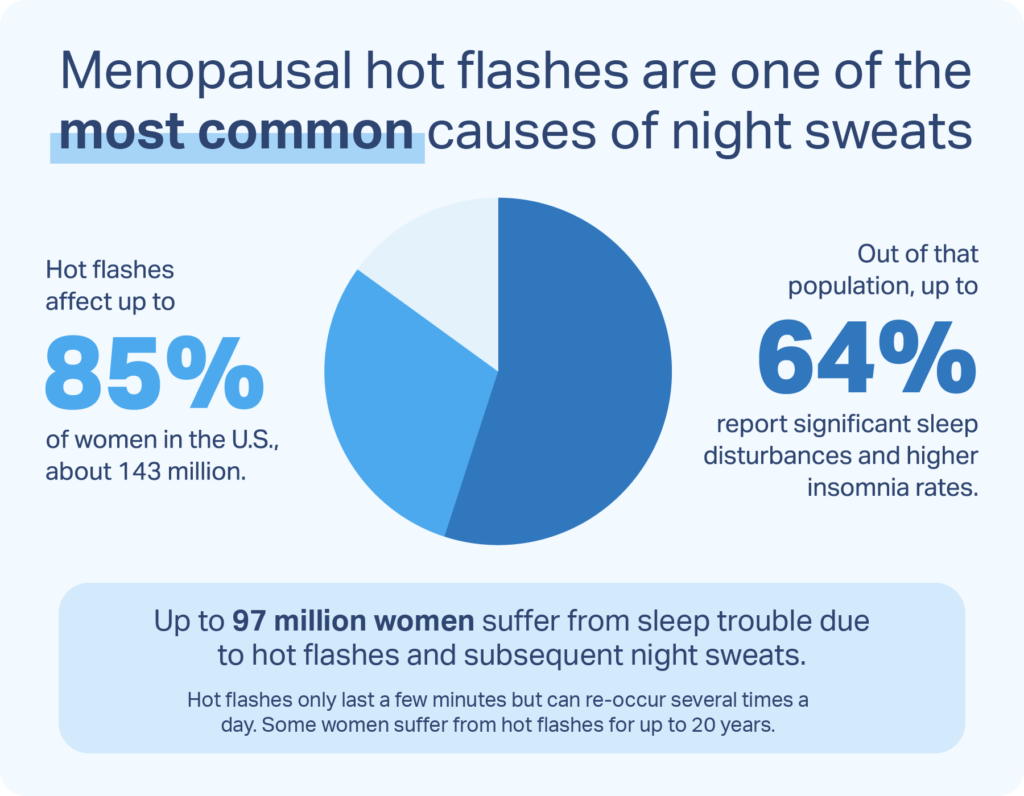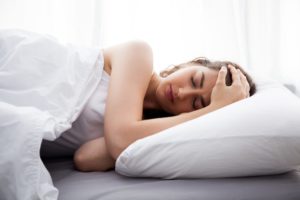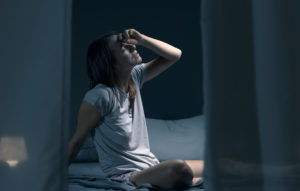Night Sweats in Women: Causes, Remedies, and Tips
- Night sweats in women can result from various causes, including hormonal changes, infections, medications, and underlying health issues.
- Talk to your doctor if you experience other symptoms, like weight loss, fever, or fatigue, alongside night sweats.
- Reduce night sweats by addressing the underlying cause, investing in breathable bedding materials, cooling down your bedroom, and relieving stress before bed.
Night sweats are a common complaint. In one study, 41% percent of people reported recently experiencing night sweats, but women tend to experience them more than men. Part of the reason for this difference is that night sweats tend to accompany perimenopause and menopause. Still, there are many other physiological processes and underlying health conditions that can cause night sweats in both men and women.
Although many people have woken up sweaty due to heavy blankets, night sweats are not caused by the bedroom environment. Instead, the cause is internal. Night sweats do not necessarily indicate that there is something medically wrong, but their association with some serious conditions means that it is important to speak to your doctor if you are concerned. Night sweats can also be uncomfortable and disturb sleep, as some people sweat enough to soak through their pajamas and bedding.
Common Causes of Night Sweats in Women
While sweating might seem like a simple reaction to heat or exercise, it involves a complex system that is affected by many factors. Because of these factors, there is no single answer to explain what causes night sweats in women, since the cause differs from person to person. However, night sweats are often caused when a bodily process or underlying health condition impacts the thermoneutral zone .
The thermoneutral zone is the range of temperatures our body is comfortable with. Shivering is used to warm us up, and sweating is used to cool us down, so that we can stay within this range. While most people have a similar thermoneutral zone, it is a dynamic range that can be influenced by gender, health, and fitness. If your thermoneutral zone increases or narrows during sleep, this change can provoke night sweats.
If you are concerned about night sweats, or if they make sleeping difficult for you, your first step should be to speak with your doctor. Although not all night sweats are triggered by an underlying health condition, your doctor can help determine why you are sweating at night and if you require treatment.
Perimenopause and Menopause
Hormones can affect how we sweat. Up to 80% of women who are going through perimenopause or menopause experience hot flashes or night sweats. Together, these two symptoms are known as vasomotor menopausal symptoms and can cause discomfort and a lower quality of life for women who experience them.
Vasomotor menopausal symptoms can begin in perimenopause, the period of time before menopause that is characterized by fluctuating hormones. In addition to continuing throughout menopause, vasomotor menopausal symptoms can also reoccur for post-menopausal women.
Signs that you may be entering perimenopause or menopause include:
- Changes to your menstrual cycle
- Vaginal dryness or infections
- Bladder incontinence or infections
- Difficulty sleeping
- Changes to your libido
- Mood disturbances
- Physical changes, including weight gain or loss
The severity of vasomotor menopausal symptoms can vary dramatically from person to person and within the same person over time. In addition to excessive and sometimes extreme sweating, menopause-related night sweats or hot flashes are often accompanied by red skin blotches, excessive sweating, and shivering. They usually last between half a minute and ten minutes, though their frequency can range from multiple times an hour to multiple times a month.
Your doctor can provide additional information and support if you believe you may be going through perimenopause or menopause. While these life stages are a normal part of the aging process, there are treatments that can help alleviate symptoms like night sweats. Depending on the severity of your symptoms and other factors, these treatments may include lifestyle changes, dietary supplements, and hormonal or nonhormonal medication.

Nonmenopausal Hormone Fluctuations
While menopausal hot flashes and night sweats may be more well-known, these symptoms can also be caused by the normal hormonal fluctuations of the menstrual cycle or pregnancy.
Some women experience night sweats at different stages of their menstrual cycle. Women with premenstrual dysphoric disorder (PMDD) often experience sleep disturbances and poor sleep quality. Other symptoms of PMDD include mood changes, anxiety, depression, loss of concentration, and lack of energy.
Over one-third of pregnant women report experiencing hot flashes or night sweats, and 29% continue to experience them after delivery. Pregnancy-related sweating appears to peak around week 30, while postpartum sweating peaks two weeks after delivery. Risk factors for pregnancy-related sweating include depressive symptoms and high body weight.
Premature Ovarian Insufficiency
Premature ovarian insufficiency can cause some women to develop menopausal symptoms, including night sweats and hot flashes, at a much earlier age than would be explained by perimenopause.
Previously called ovarian failure, premature ovarian insufficiency occurs when the ovaries stop working normally before the age of 40, causing menopausal symptoms and fertility loss. It is distinct from premature menopause, as women with premature ovarian insufficiency may still have occasional periods .
Researchers are still trying to understand what triggers premature ovarian insufficiency, and 90% of cases have an unknown cause. The condition is underdiagnosed and can increase a woman’s risk of infertility, osteoporosis, and heart disease, so it is important to speak to your doctor if you experience any concerning symptoms. Premature ovarian insufficiency is a chronic condition, but there are treatments that can help alleviate uncomfortable symptoms like night sweats.
Anxiety and Stress
More than 30% of women are diagnosed with an anxiety disorder at some point in their lives, and around 63% of women report at least moderate stress levels. Both short-term and chronic anxiety or stress can cause night sweats, possibly by making sweat glands more responsive.
There is also the possibility that anxiety may make people more likely to notice nighttime sweating, either due to anxiety-related sleep disturbances or because they are worried about the health implications of night sweats. If you are concerned about night sweats or your stress levels, your doctor can determine if you have any underlying health conditions and suggest treatment options.
Medications
Night sweats may be caused by medication you are taking. Some people only experience night sweats, but other people find that their medication causes excessive sweating during the day as well. Some medications with this side effect include:
- Painkillers like aspirin and nonsteroidal anti-inflammatory drugs (NSAIDs) like ibuprofen
- Antidepressants, including tricyclic antidepressants and selective serotonin reuptake inhibitors (SSRIs)
- Cortisone and some other corticosteroids
- Diabetes treatments like hypoglycemic agents
If you believe that your night sweats are caused by a medication you have been prescribed, talk to your doctor before you change your dosage or stop taking it.
Obstructive Sleep Apnea (OSA)
Obstructive sleep apnea (OSA) is a common sleep breathing disorder that can cause night sweats in some people. People with OSA experience multiple apneas, or pauses in their breathing, while asleep due to their airway collapsing or being blocked by excess tissue.
A reported 33% percent of women with OSA may experience night sweats due to the condition. However, sleep apnea treatment appears to help relieve this symptom. Other common symptoms of OSA include:
- Snoring, gasping, and choking during sleep
- Excessive daytime sleepiness
- Depression and other mood changes
- Difficulty concentrating during the day
- Regularly waking up during the night
OSA is a chronic condition that requires treatment. The most common treatment involves using a continuous positive airway pressure (CPAP) device, but other treatment options include lifestyle changes, oral appliances to open the airway, and surgery.
Infections
Infections release inflammatory mediators that raise your thermoneutral zone. This causes a familiar fever cycle, beginning with shivering to raise your internal temperature. Once your thermoneutral zone returns to normal, you will likely start sweating to decrease your temperature. This cycle usually occurs repeatedly during an infection and can cause night sweats if it happens at night. Your body’s viral or bacterial load may also rise during sleep, increasing the likelihood of night sweats.
Serious infections that can cause night sweats include:
- Tuberculosis
- Human immunodeficiency virus (HIV)
- Brucellosis
- Endocarditis
Hyperhidrosis
People with hyperhidrosis sweat excessively without being triggered by heat or exercise. The sweating can occur during the day or at night, and it can be severe enough to soak through clothing and bedding. Skin problems, particularly on the palms, can also develop due to excess moisture.
Hyperhidrosis can occur without an underlying trigger, or it can be caused by medication or a health condition. The most common treatments for this condition include oral and topical medication, surgery, and the use of botulinum toxin to block neurotransmitters.
Other Causes
Night sweats are a symptom of many other health conditions and physiological processes. Of these, some of the more serious causes include:
- Hyperthyroidism: Both night sweats and excessive daytime sweating are symptoms of hyperthyroidism , which is also known as having an overactive thyroid. Other symptoms of this common condition include weight loss, tremors, fatigue, heart palpitations, disturbed sleep, and anxiety. Night sweats and other symptoms usually respond well to treatment.
- Neurological Conditions: Conditions that damage the brain can cause unusual and excessive sweating, including night sweats. For example, people who have had a stroke may experience excessive sweating on only one side of their body. Other neurological conditions that may cause night sweats include neuropathy , autonomic dysreflexia , and syringomyelia .
- Cancer: Both cancer and cancer treatments are known to cause night sweats. The symptom may occur early, mid-treatment, or even in cancer survivors whose disease is in remission. While it is most important to treat the cancer itself, medication and lifestyle changes can reduce night sweats during and after treatment.
When to Talk to Your Doctor
Night sweats can be uncomfortable and sometimes frightening. Not all night sweats are caused by an underlying condition, but you should speak to your doctor about new or unusual night sweats, or night sweats that occur regularly and do not respond to lifestyle changes. Your doctor can take steps to diagnose any underlying health condition and ensure you receive appropriate treatment.
Other symptoms that merit a visit to your doctor if they occur with night sweats include:
- Weight loss without changing your diet or exercising more
- Unexplained fever
- Excessive daytime sleepiness and fatigue
- Muscle weakness
- Sleep disturbances
- Mood changes
Tips to Reduce Night Sweats
Although many health conditions may cause night sweats, treating the condition often relieves the symptom. However, not all night sweats are caused by an underlying condition, and the results of treatments are not always immediate. In addition to any medical treatments suggested by your doctor, other ways of relieving night sweats include:
- Breathable Bedding: Bedding and pajamas made of breathable, moisture-wicking fabric can help keep you cooler and more comfortable at night. If you regularly sweat through your bedding or clothes, consider keeping extra sets within easy reach.
- Air Conditioning: Keeping your room at a cool temperature may be more comfortable. It is also easier to sleep better when the room is not too hot, even for people who do not experience night sweats.
- Stress-Relieving Techniques: Night sweats can be stressful, as are many of the conditions that cause them. Stress also worsens night sweats, making relaxation techniques a useful approach. Some popular methods to reduce stress include mindfulness, guided imagery, meditation, and breathing exercises. Hypnosis and cognitive behavioral therapy can also help.
- Maintaining a Healthy Weight: Excess weight can be both a cause of night sweats and a risk factor for conditions that cause night sweats, such as sleep apnea.
- Avoiding Caffeine, Alcohol, and Spicy Food: These foods can affect your internal temperature and cause you to sweat. If you experience night sweats, avoiding eating or drinking these close to your bedtime may help relieve your symptoms or avoid triggering them further.
References
18 Sources
-
Kingma, B., Frijns, A., & van Marken Lichtenbelt, W. (2012). The thermoneutral zone: Implications for metabolic studies. Frontiers in Bioscience (Elite Edition), 4, 1975–1985.
https://pubmed.ncbi.nlm.nih.gov/22202013/ -
Deecher, D. C., & Dorries, K. (2007). Understanding the pathophysiology of vasomotor symptoms (hot flushes and night sweats) that occur in perimenopause, menopause, and postmenopause life stages. Archives of Women’s Mental Health, 10(6), 247–257.
https://pubmed.ncbi.nlm.nih.gov/18074100/ -
Whiteley, J., DiBonaventura, M. daCosta, Wagner, J.-S., Alvir, J., & Shah, S. (2013). The impact of menopausal symptoms on quality of life, productivity, and economic outcomes. Journal of Women’s Health (2002), 22(11), 983–990.
https://pubmed.ncbi.nlm.nih.gov/24083674/ -
Hantsoo, L., & Epperson, C. N. (2015). Premenstrual dysphoric disorder: Epidemiology and treatment. Current Psychiatry Reports, 17(11), 87.
https://pubmed.ncbi.nlm.nih.gov/26377947/ -
Torrealday, S., Kodaman, P., & Pal, L. (2017). Premature ovarian insufficiency—An update on recent advances in understanding and management. F1000Research, 6, 2069.
https://pubmed.ncbi.nlm.nih.gov/29225794/ -
A.D.A.M. Medical Encyclopedia. (2021, June 14). Primary ovarian insufficiency. MedlinePlus., Retrieved June 17, 2021, from
https://medlineplus.gov/primaryovarianinsufficiency.html -
McLean, C. P., Asnaani, A., Litz, B. T., & Hofmann, S. G. (2011). Gender differences in anxiety disorders: Prevalence, course of illness, comorbidity and burden of illness. Journal of Psychiatric Research, 45(8), 1027–1035.
https://pubmed.ncbi.nlm.nih.gov/21439576/ -
Wiegner, L., Hange, D., Björkelund, C., & Ahlborg, G. (2015). Prevalence of perceived stress and associations to symptoms of exhaustion, depression and anxiety in a working age population seeking primary care—An observational study. BMC Family Practice, 16, 38.
https://pubmed.ncbi.nlm.nih.gov/25880219/ -
Das, S. (2020, June). Hyperhidrosis., Retrieved June 16, 2021, from
https://www.merckmanuals.com/professional/dermatologic-disorders/sweating-disorders/hyperhidrosis#v963302 -
Arnardottir, E. S., Janson, C., Bjornsdottir, E., Benediktsdottir, B., Juliusson, S., Kuna, S. T., Pack, A. I., & Gislason, T. (2013). Nocturnal sweating–A common symptom of obstructive sleep apnoea: The Icelandic sleep apnoea cohort. BMJ Open, 3(5), e002795.
https://pubmed.ncbi.nlm.nih.gov/23674447/ -
Sari, R., Bayindir, Y., Sevinc, A., Bahceci, F., & Ozen, S. (2002). The triad of weight loss, fever and night sweating: Isolated bone marrow tuberculosis, a case report. Journal of Chemotherapy (Florence, Italy), 14(4), 420–422.
https://pubmed.ncbi.nlm.nih.gov/12420863/ -
Johnson, M. O., Stallworth, T., & Neilands, T. B. (2003). The drugs or the disease? Causal attributions of symptoms held by HIV-positive adults on HAART. AIDS and Behavior, 7(2), 109–117.
https://pubmed.ncbi.nlm.nih.gov/14586196/ -
Ewals, J. A. P. M. (2005). Brucellosis as an imported disease in a young man with arthritis. Nederlands Tijdschrift Voor Geneeskunde, 149(50), 2810–2814.
https://pubmed.ncbi.nlm.nih.gov/16385835/ -
Shetty, A., Ribeiro, D., Evans, A., & Linnane, S. (2004). Gonococcal endocarditis: A rare complication of a common disease. Journal of Clinical Pathology, 57(7), 780–781.
https://pubmed.ncbi.nlm.nih.gov/15220379/ -
Bryce, C. (2020). Persistent night sweats: Diagnostic evaluation. American Family Physician, 102(7), 427–433.
https://pubmed.ncbi.nlm.nih.gov/32996756/ -
Flores, S., Davis, M. D. P., Pittelkow, M. R., Sandroni, P., Weaver, A. L., & Fealey, R. D. (2015). Abnormal sweating patterns associated with itching, burning and tingling of the skin indicate possible underlying small-fibre neuropathy. The British Journal of Dermatology, 172(2), 412–418.
https://pubmed.ncbi.nlm.nih.gov/25597261/ -
Khanna, K., Theologis, A. A., & Tay, B. (2017). Autonomic dysreflexia caused by cervical stenosis. Spinal Cord Series and Cases, 3, 17102.
https://pubmed.ncbi.nlm.nih.gov/29423305/ -
Stanworth, P. A. (1982). The significance of hyperhidrosis in patients with post-traumatic syringomyelia. Paraplegia, 20(5), 282–287.
https://pubmed.ncbi.nlm.nih.gov/7177694/











